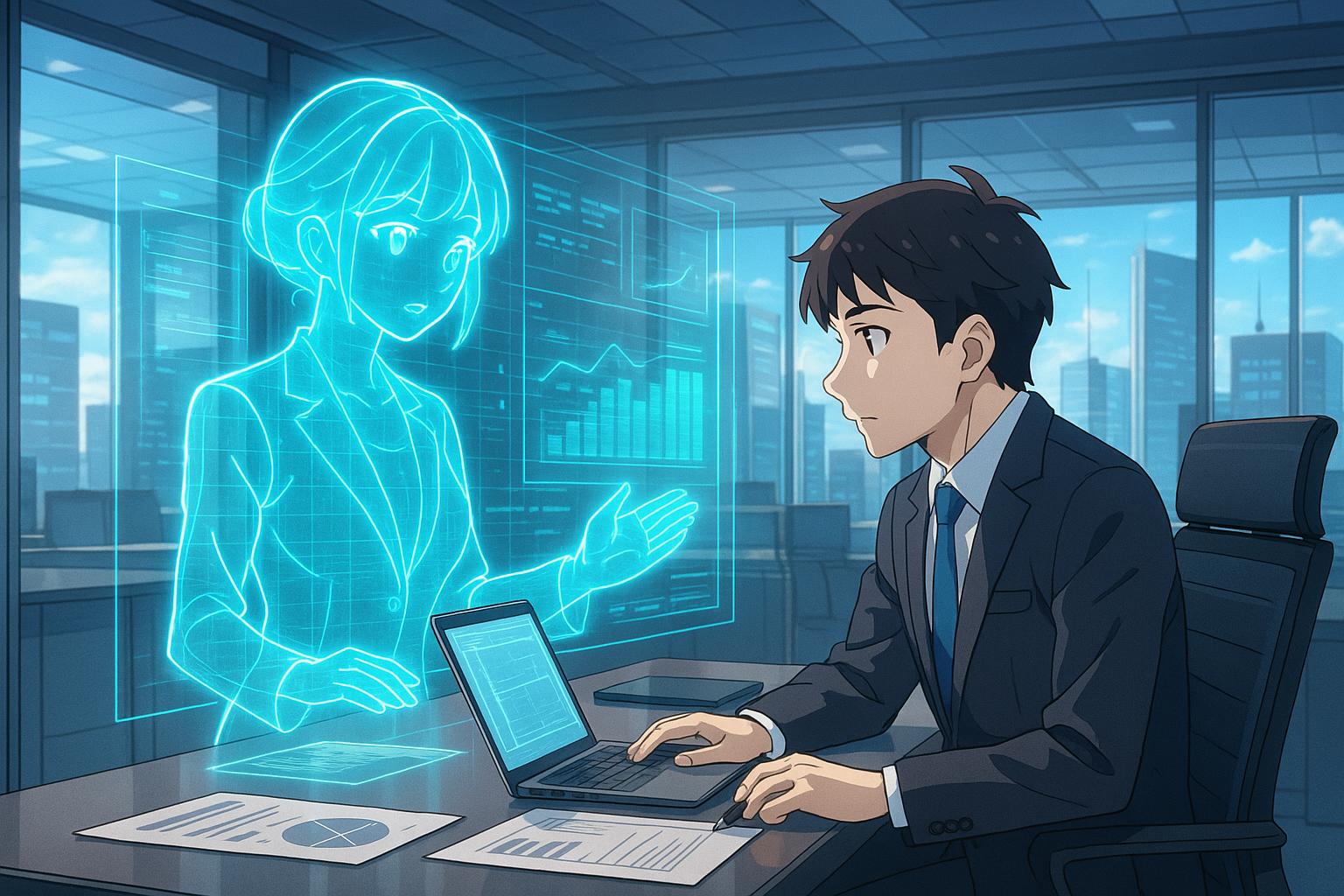AI is evolving beyond customer service to become digital co-workers in sectors like recruitment and manufacturing, enabling employees to shift from routine tasks to complex problem-solving. Industry leaders stress the importance of training and integration as AI reshapes job roles and workplace culture.
The rapid evolution of artificial intelligence (AI) is reshaping business operations across multiple sectors, moving beyond the initial focus on customer experience to significantly enhance internal workflows. Now, AI systems are emerging as vital digital co-workers and operational assistants, fundamentally changing employee roles. Industry experts suggest that this transition signals an opportunity for employees to shift from routine task execution to complex problem-solving—a change that comes with significant implications for workplace dynamics.
Dr Pete Stanski, Chief Technology Officer at V2 AI, articulated this shift, noting, “While Agentic AI has to date mainly been focused on customer experience, the next opportunity lies in employee assistance.” He underlined that although AI excels in executing routine tasks, the indispensable qualities of human workers—such as creativity, strategic thinking, and interpersonal skills—remain irreplaceable. As tasks become increasingly automated, there is a pressing need for human workers to acquire new skills to tackle these complex challenges. Stanski emphasised the importance of proper training and oversight for AI agents, stating that organisations must invest in these digital counterparts as they would with new hires, ensuring they are effectively integrated into workplace processes.
This transformation is particularly evident in the recruitment industry, which historically suffers from an overwhelming administrative burden. Joel Delmaire, Chief Product Officer at JobAdder, highlighted the stress and inefficiencies that recruiters face due to surging application numbers juxtaposed with stagnant job openings. “Recruiters didn’t get into this field to clean up CRMs or process the 2,100 CVs they tell us they process every quarter,” he remarked. Instead, many AI tools still struggle with proper integration, leading to user frustrations. However, Delmaire expressed optimism regarding the development of more mature AI solutions like those JobAdder is implementing, which can automate tasks like candidate matching and data management. He foresees a future where AI enhances the human aspect of recruitment: “AI is not about replacing people. It is about giving them back the time and focus to do the work that matters.”
In the manufacturing sector, the impact of AI is equally profound. The introduction of Mayvn AI by Operations Feedback Systems (OFS), supported by consultancy Decision Inc. Australia, illustrates this shift. Embedded within analytics platforms used by major firms like Asahi and AstraZeneca, Mayvn AI serves as an operational assistant, providing leaders with quick insights on production issues, associated risks, and avenues for improvement. James Magee, CEO of OFS, explained that their aim was to create a meaningful tool, stating, “We didn’t want AI just for the sake of AI; we wanted it to solve real problems.” Since its rollout, Mayvn AI has been integrated into over 200 manufacturing sites globally, enabling leaders to make informed, data-backed decisions with confidence.
The integration of AI in various sectors highlights a consistent theme: AI agents are transforming the roles of both employees and employers. As organisations deepen their efforts to embed AI into everyday processes, the focus is shifting towards thoughtful integration and comprehensive training—all aimed at harnessing human strengths in conjunction with AI capabilities. This convergence is not about replacing individuals but rather about empowering teams to engage in high-value tasks that ultimately drive business success.
Furthermore, as the labour market adapts to incorporate AI, new job roles and skill requirements are emerging, with a noticeable uptick in demand for AI-savvy workers. While some companies replace positions outright, many others are discovering ways to use AI to enhance productivity and simply improve existing roles. A report highlighted that while firms like IBM and Klarna have made significant cuts to their workforce through automation, others are utilising AI to create a more agile, efficient workplace.
Across the spectrum, the integration of AI technologies appears to be fostering a significant shift in workplace cultures, pushing forward a future where human intelligence and technological assistance coexist more symbiotically. As the implementation of AI continues to evolve, it is clear that the future of work will require a re-evaluation of skills and an embrace of new collaborative roles that focus on innovation and human connection.
 Reference Map:
Reference Map:
- Paragraph 1 – [1], [4]
- Paragraph 2 – [1], [2], [6]
- Paragraph 3 – [3], [5]
- Paragraph 4 – [1], [2], [6]
- Paragraph 5 – [1], [3]
- Paragraph 6 – [2], [3], [4]
- Paragraph 7 – [2], [6]
Source: Noah Wire Services
- https://itbrief.com.au/story/ai-agents-reshape-workplace-roles-freeing-employees-for-key-tasks – Please view link – unable to able to access data
- https://www.ft.com/content/5009fd1e-85db-433f-aa2b-55d9b88b6481 – This article examines the profound impact of generative AI on the labour market, highlighting how technological advancements are transforming rather than outright eliminating jobs. Companies like Ocado have significantly reduced human labour through AI and robotics, prompting concerns about widespread job displacement. While some large firms, such as IBM and Klarna, have replaced large numbers of roles with AI, others like Schroders and Moderna are integrating AI to augment existing staff and improve productivity. The shift is altering job roles and skill requirements, with AI-savvy workers earning higher wages and being more in demand.
- https://www.red-fern.co.uk/engine-room/digital-minds/how-ai-agents-are-reshaping-the-workforce-in-manufacturing/ – This article discusses the transformative role of AI agents in the manufacturing sector, focusing on their ability to reduce human error, augment human roles, improve workplace safety, and provide upskilling opportunities. AI agents excel at tasks requiring precision and consistency, such as quality inspections, and assist machine operators by providing real-time insights into machine performance. They also contribute to safer working environments by handling hazardous materials and performing repetitive tasks, and facilitate upskilling by enabling workers to develop higher-value skills.
- https://www.ibm.com/think/topics/ai-agents-in-human-resources – This article explores the various applications of AI agents in human resources, including employee engagement and retention, onboarding and training, performance management, streamlining HR management and administration, and talent acquisition. AI agents can proactively address employee needs, automate administrative tasks, create actionable goals and career development plans, and streamline various HR processes, thereby enhancing efficiency and allowing HR professionals to focus on more strategic initiatives.
- https://www.supplychaintoday.com/ai-agents-transform-how-people-work/ – This article highlights how AI agents are transforming work processes by automating routine and repetitive tasks, enhancing decision-making, fostering collaboration, and contributing to employee well-being. AI’s ability to automate tasks allows employees to focus on higher-level activities that require human intelligence and creativity, while AI-powered tools can monitor employee sentiment and provide support resources, leading to a more efficient, dynamic, and creative workplace.
- https://www.forbes.com/councils/forbeshumanresourcescouncil/2025/02/25/are-ai-agents-the-future-of-recruiting/ – This article discusses how AI agents can support HR teams by handling tasks such as data gathering, candidate sourcing, and predictive analytics. AI agents can gather critical talent information from multiple sources, source talent in real time, and predict candidate behaviour, thereby streamlining the recruitment process and allowing HR professionals to focus on building a workforce that drives growth.
- https://www.trentcotton.com/blog/ai-agents-hr-transformation-strategic-implementation – This article examines how AI agents are transforming core HR functions, including recruitment and talent acquisition, employee experience and development, and strategic workforce planning. AI agents can source candidates across multiple platforms, provide consistent support to employees, and analyse vast amounts of organisational and external data to identify trends and predict risks, thereby enhancing HR processes and enabling organisations to adapt to future workforce demands.













